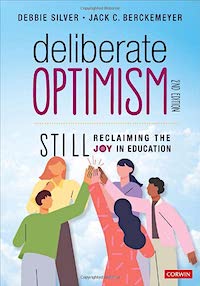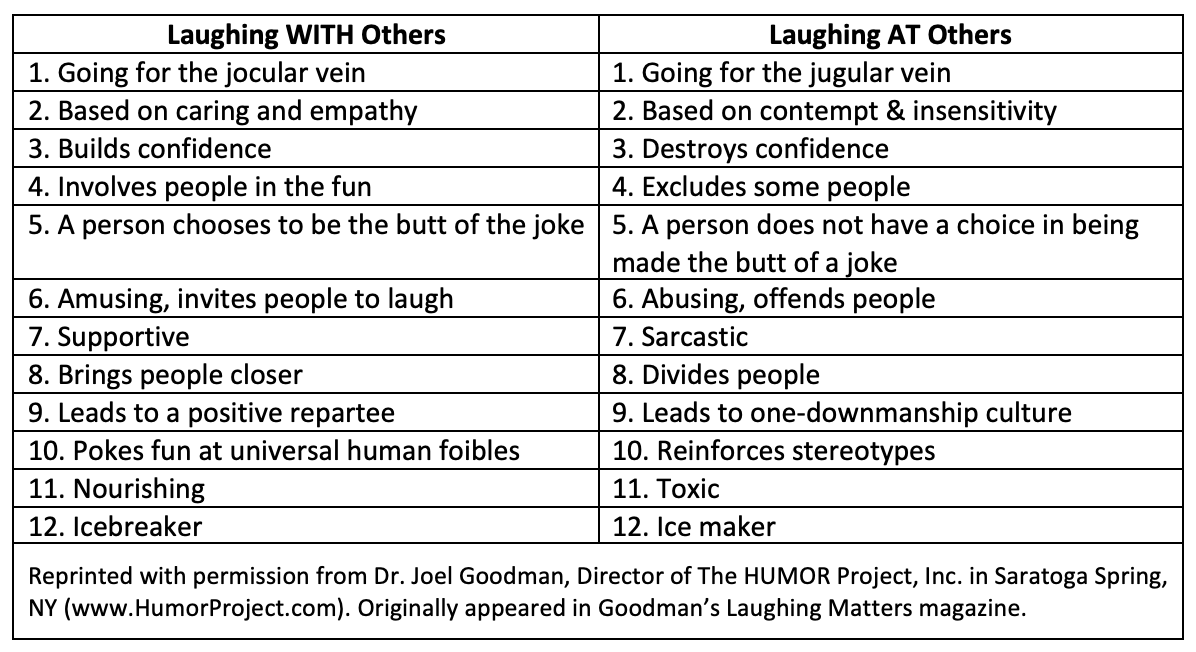Humor in Our Schools Heals and Engages Us
Debbie Silver is the author of Deliberate Optimism; Fall Down Seven Times, Get Up Eight; and other books and articles celebrating the indomitable spirit of passionate educators. She speaks regularly to teachers and school leaders across the USA.
By Dr. Debbie Silver

When the last bell rang, we dismissed our sluggish students and followed them into the hall as they departed. A group of sixth grade boys neared the open doorway leading outside and quickly picked up speed. I was standing with a group of my cohorts when one of them whispered dramatically, “Wait for it . . . and 3-2-1!”
As if on cue each boy ran up, jumped, and slapped the threshold above the door as high as he could and shouted “Score!” on his way out. I turned to the group and asked, “And that’s what they’ve been saving their energy for?” The three of us burst out laughing.
“Why do they always do that?” asked someone as we snorted and giggled. “I think it’s in their contract,” I said as the sniggers increased. “I think it’s hardwired into the 6th grade boy brain!” chimed in another as we laughed and shook our heads at the incongruity of dealing with young adolescents.
If you’ve never worked (or lived) with middle school boys, you probably have no idea what I’m talking about, but I have just described a ritual that is as inescapable as educators higher on the food chain calling too many meetings.
Humor Unites Us
What is notable about this incident is that rather than yelling at the boys or grinding our teeth, the four of us took a moment to laugh at one of the many quirks of those impulsive, sometimes inscrutable, but often predictable young people we dealt with throughout the school year.
And in that moment of amusement, we were able to distance ourselves from the annoyance of dealing with the student apathy we had faced all day. We were able to put some much-needed space between our pent-up frustration and a response that would be calmer and more reasoned. (We all agreed next year we’d prepare lessons better geared to engage our glucose over-indulgers after Halloween!)
Laughter Is Important
A good belly laugh does worlds of good for the soul – it relaxes the body, releases positive brain chemicals, strengthens immunity, gives us better perspective, and helps build positive relationships.
Whether you take a moment to watch funny cat videos on YouTube, share jokes with friends, or just get silly with your students, humor activates optimism and joy. Even a shared chuckle during a trying time for a co-worker can communicate “You’re not alone, I understand, and we’ll get through this.” Humor often provides that much needed space to make problems feel less formidable and give us greater objectivity and insight. Inclusive humor unites us.
When I am asked to evaluate schools, the first thing I look at is the relationships between the adults and the students. The second is the relationships among the adults themselves. Are they friendly to each other? Do they smile at each other? Do they seem to enjoy each other’s company? And, most importantly, do they laugh?
How in the world can educators work in the hyperactive, zany world of middle school if we can’t laugh with our students, with our colleagues, and at ourselves? Education is a serious business, but we cannot take ourselves too seriously. We are humans dealing with other humans, and quite frankly, some of our common human foibles are pretty funny.
Optimism Is a Choice
In my research on deliberate optimism, a clear constant that emerges is that optimism is a choice. We cannot control external circumstances, but we can control the way we view and react to things.
In our present-day culture of knee-jerk reactiveness, we can calm our mental states by putting some distance between stimulus and response. Humor can help when something provokes us by allowing our brains to move from our agitated limbic system to our calmer, more rational pre-frontal cortex where we make better choices about our reactions. For some people humor comes naturally. For others it needs to be cultivated.
One doesn’t have to be a stand-up comedian, a superb joke teller, or even a perennial jokester. We can all probably name several colleagues who fit into those categories, but that’s not really the point. The point is humor comes from the way we view situations, and the ability to refrain from taking external stimuli personally. Most laughter does not come from jokes; it comes from spending time with our family, our friends, our colleagues, and our students. It comes from a shared sense of comfort and trust.
Self-Deprecating Humor
Self-deprecating humor is a hallmark of self-efficacy, tolerance, and empathy. Those who can laugh at themselves generally suffer less anxiety, exhibit more optimism, and exemplify a humility that connects them with others.
The most effective middle level teachers I know can hear the snarky personal comments made by students and colleagues, acknowledge any truth there may be in the statements, and laugh off incredibly thoughtless and outlandish statements.

Humor needs to be modeled, fostered, and valued by administrators and teacher leaders. I recently presented a keynote to a group of teachers in a very conventional, administratively heavy-handed school district. I started with my usual joking around to try and break the ice but rather than laugh out loud, teachers nervously scanned the leaders in the room to see if it was okay to laugh. It was not. Obviously, they were accustomed to professional development that was “all business all the time.”
As I delivered an important message with intentional funny moments to break the tension, teachers covered their mouths to keep from laughing out loud. It broke my heart to see the stress and lack of joy in that staff. I thought to myself, “I would never want to work here, and I’ll bet their turnover rate is substantial.”
Choosing optimism, surrounding myself with people who can laugh even in the face of adversity, and finding humor in the whacky world of middle level education has helped me last for several decades in this field. It is time to restore laughter in our schools and to our lives.
Read another article by Debbie Silver here on MiddleWeb:
“4 Ways to Reclaim Our Optimism for Our Schools”
Read teacher Kathie Palmieri’s review
of Deliberate Optimism (2nd Edition):
“Filling Your Classroom with Deliberate Optimism”
A Word of Caution
I want to be clear about my recommendation for using humor to promote a positive work environment. Of course, we want to mindful of learning goals, student needs, and parental engagement. We want to demonstrate a serious, thoughtful, professional approach to the important business of teaching students. We need to demonstrate that we know what we are doing. We also need to ensure that the humor we employ includes everyone. We cannot use humor to deride, humiliate, or exclude anyone.
As a middle school teacher, I made the time to discuss with students the difference between appropriate humor and inappropriate humor. Adults, too, should be aware that positive humor is inclusive. Sarcastic, rude, snarky, hurtful remarks or jokes that hurt others (i.e., reinforcing stereotypes) only serve to separate and exclude, which is never okay.
Years ago, I found this excellent chart (above) clarifying humor that is inclusive as opposed to humor that is exclusive. Dr. Joel Goodman, Director of The HUMOR Project, Inc. graciously granted me permission to share it.
Laugh Together
The bottom line is that is if you want to enhance your own longevity as an educator or if you want to build a staff that will remain in education, pay attention to how much you laugh together. Teachers and school leaders who laugh, last.

Debbie’s many other MiddleWeb articles include the widely read “Empowering Our Kids to Motivate Themselves.” Follow her on X/Twitter and visit her website for more resources and information about her speaking and PD services.






























